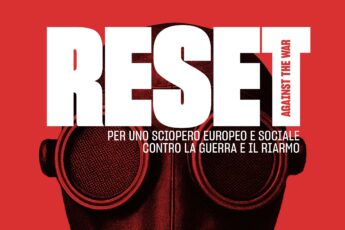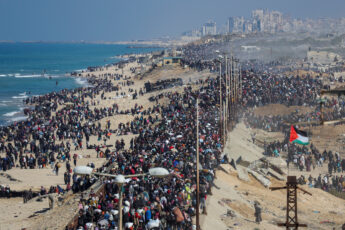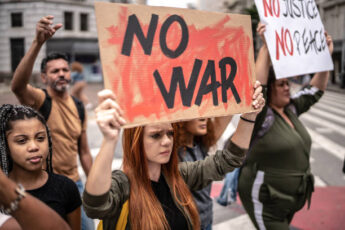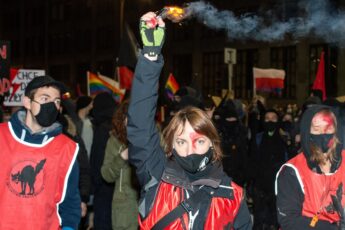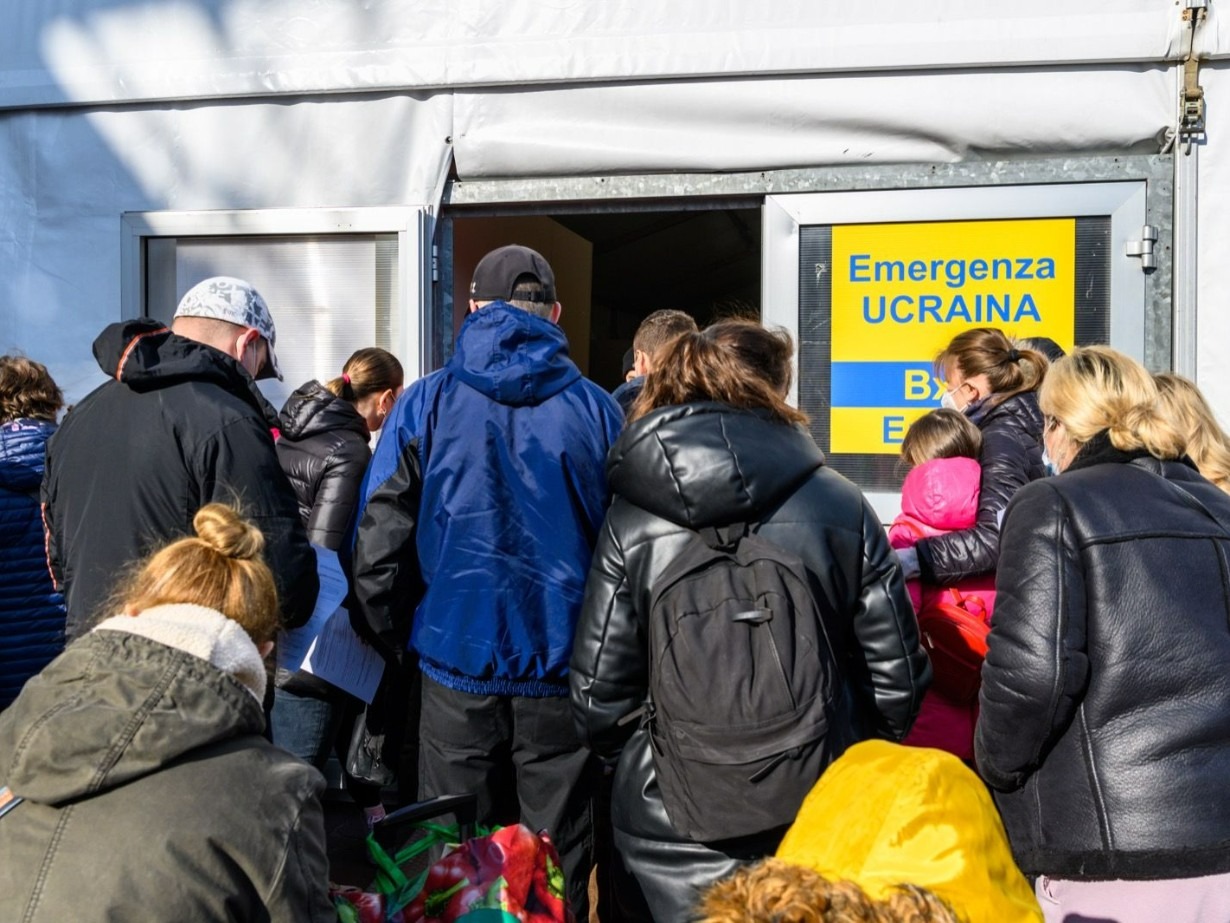
by Migrants’ Coordination (Bologna)
We publish two short interviews translated from Italian with M., a migrant from Nigeria who escaped from Kiev at the beginning of the Russian invasion of Ukraine, and Maria, a Ukrainian care-worker who has been living in Italy for 20 years and is now providing for her family fleeing from the war. The two interviews highlight the different forms of violence that war is exasperating: patriarchal and sexual violence against women and children; institutional racism against black migrants brutally pushed back at the borders; the violence of exploitation for those who now see all their life savings vanishing in the effort to help relatives fleeing from the bombs. War is exacerbating hierarchies and discrimination and reinforcing sexist division of labour and gendered roles: men should be patriots who die for their country; women are needy victims but must prepare for undervalued and underpaid care work in their hosting countries; transgender women are identified as men and therefore banned from leaving Ukraine. Against all this, migrants are denouncing a whole system of racism, exploitation and patriarchal violence. On April 9th, the Permanent Assembly against War will give voice and space to their experience of the war, to form a common front for a transnational politics of peace.
Interview to M.
I went from Nigeria to Ukraine to play football. First, I arrived in Kiev, then I went to Odessa to play for a team there. I had just started playing when the war broke out on February 24 and the Russians started attacking the city. The situation became immediately tense. Many people were looking for the fastest way to flee the city fearing attacks, and in the end I decided to leave too. It was horrible. I went to Odessa’s station to take a train to Uzhhorod, near the Slovakian border.
Even getting on the train has been hard, especially for us blacks and African migrants. They made sure that the Ukrainians and white people got on first. There were a lot of us, but they wouldn’t let us take the train. At first, they told us that we should have let mothers and children go first, and we understood and accepted this; but then we thought they would have let us go. But it wasn’t easy at all. Their problem was our skin colour. We had to push and struggle to get on the train.
In Uzhhorod it was even worse. They stopped us at the border where we waited for three days, standing in the streets, freezing, without anyone telling us anything or giving us any information. They let Ukrainian women and their children go, and all they said to us was “you cannot pass.” They told us, “Only women can pass.” So we replied, “Well, there are women among us! There are female students, as well as African women with their children and pregnant women.” But they halted them at the border together with everyone else. We were always told to wait, stay put, and keep quiet. On the third day, at 3 am, some Moroccan guys got pissed off at this discrimination. Why not let us through? We were running away from the same war that was affecting everyone! But the police pushed us back and the clashes started, the border police started to spray us with pepper spray in the eyes. There I lost my wallet with my Ukrainian residence permit, but I managed to get through – my eyes were still burning from the pepper spray. Once I was on the other side of the border, I took a train to Berlin.
The Germans gave me a ticket to come to Italy. I had been dreaming of coming to Italy for years, it’s the country I wanted to live in. I had an appointment to apply for a visa in 2020, but then they cancelled everything because of Covid, and six months ago I had the chance to go to Ukraine. When the war started, once crossed the border, I had the possibility to go anywhere in Europe, so I decided to come here. I passed through the Czech Republic, Germany, Austria, but my idea was to stop in Italy.
What about your residence permit?
In Ukraine I had a one-year temporary residence permit. Here in Italy I still don’t have a document. They only gave me the health document, for medical treatment, which says there that I’m from Ukraine. They gave me a legal advisor, but he told me that at the moment the EU wants to give protection only to Ukrainian citizens or permanent residents, so I still don’t know if I can have protection here.
There is an enormous difference in treatment with Ukrainian citizens. It is easy if you are a white Ukrainian. When I went to the Ukrainian Emergency Centre in Piazza XX Settembre and I said I was from Ukraine, they asked me to prove it. I showed them my documents, visas, proof that I lived in Ukraine. Even the passport I got from the Nigerian Embassy in Ukraine, which in fact says clearly that it has been issued in Kiev. I showed it to them, and I also showed them my Ukrainian house’s tenancy. But I have black skin and they told me I’m not Ukrainian. After making me fill in some papers, they sent me away and then called me on the phone the next day to tell me I could come back to register. They treated me differently because I am not Ukrainian. But what does that mean? Black or white we are fleeing the same war and the same bombs.
Do you know other migrants who do not have Ukrainian passports but have fled the war?
Yes, I know others who have also arrived here in Bologna. We are all in reception centres, where there are no white Ukrainians, who are instead put to live in flats. Obviously, the Ukrainian refugees are not to blame, it’s just the usual racism that we Africans are used to. They want to set us against each other.
***
Interview to Maria
My name is Maria, I come from Lviv and I have been in Italy for 22 years. I work 24 hours a day as a caregiver for a 96-year-old woman. My wage is 1026 euro a month and it is the best job I have had in 20 years in Italy.
The Soviet Union gave me a house in Lviv, but it was raining inside, and I had to fix it up. Since my job includes board and lodging, I used to put away all the money I could for the house or my pension. Now I’m losing out. My daughter-in-law Cristina and her children arrived from Lviv three weeks ago and have found accommodation through my contacts, but I cover all the costs for food and what the children need. They are attending Ukrainian school online now. I hope they will be able to return home soon, I also want to return one day. Cristina wants to go back, she does not want to stay here. She says that if Lviv remains safe she will go back home, but if in the evening she watches the news or hears sirens, she gets scared. Even the children are frightened because they see their mother afraid. Unimaginable things are happening in Ukraine that you do not hear about on the news here. Not only women, but also children are being sexually assaulted. They rape women in front of their partners and then kill them. They rape children. Even now that she is here, Cristina is afraid to go out on her own.
I have two sons in Ukraine aged 41 and 43 who have not been called up to fight so far because they have grocery shops. But they may have to leave at any moment. “We are patriots,” they tell me. I do not want to lose my children. They would not know how to shoot and kill someone, they are good and then they are fat, so they would not make it (laughs). Anyway, they are risking even now, they hear the bombs and run to the shelters. But what if the bomb is too close to escape?
I have a brother in Moscow who asked me not to call him or write to him because he is afraid they will check up on him. He does not want me to write that Putin is a murderer. I have many friends and affections in Russia. And Putin is raising hell against them too. The point is Putin. He says it is because of NATO that he made the war, but that is just a justification. Many blacks who are in Ukraine cannot get away, it is terrible. Putin said that we Ukrainians are the racists, but he is the real racist.


